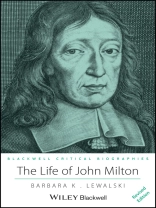Providing a close examination of Milton’s wide-ranging prose and poetry at each stage of his life, Barbara Lewalski reveals a rather different Milton from that in earlier accounts.
- Provides a close analysis of each of Milton’s prose and poetry works.
- Reveals how Milton was the first writer to self consciously construct himself as an ‘author’.
- Focuses on the development of Milton’s ideas and his art.
Daftar Isi
List of Plates.
Preface.
Acknowledgments.
List of Abbreviations.
1. ‘The childhood shews the man’ (1608-1625).
2. ‘To Cambridge . . . for seven years’ (1625-1632).
3. ‘Studious Retirement’: Hammersmith and Horton (1632-1638).
4. ‘I became desirous . . . of seeing foreign parts, especially Italy’ (1638-1639).
5. ‘All mouths were opened against . . . the bishops’ (1639-1642).
6. ‘Domestic or Personal Liberty’ (1642-1645).
7. ‘Service . . . Between Private Walls’ (1645-1649).
8. ‘The so-called Council of State . . . desired to employ my services’ (1649- 1652).
9. ‘Tireless . . . for the sake of Liberty’ (1652-1654).
10. ‘I . . . still bear up and steer/ Right onward’ (1654-1658).
11 ‘The last words of our expiring libertie’ (1658-1660).
12 ‘In darknes, and with dangers compast round’ (1660-1665).
13. ‘Higher Argument’: Completing and Publishing Paradise Lost (1665-1669).
14. ‘To try, and teach the erring Soul’ (1669-1674).
Epilogue: ‘Something … Written to Aftertimes.’.
Notes.
Bibliography.
Index.
Tentang Penulis
Barbara Lewalski is William R. Kenan, Jr. Professor of English Literature and of History and Literature, and Director of Graduate Studies in English at Harvard University. She has been named honored scholar by the Milton Society of America, and has served as President of that organization and of the Society for the Study of Early Modern Women. Her numerous publications include Milton’s Brief Epic: The Genre, Meaning and Art of ‘Paradise Regained’ (1966), Protestant Poetics and the Seventeenth Century Religious Lyric (1979, winner of the James Russell Lowell Prize of the Modern Language Association), Paradise Lost and the Rhetoric of Literary Forms (1985), Writing Women in Jacobean England (1993), and The Polemics and Poems of Rachel Speght (editor, 1996).












